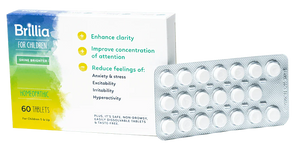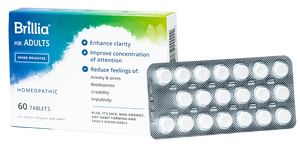5 Signs of Impulsivity
Have you ever grabbed a treat at the grocery store even though it wasn’t on your shopping list? Or blurted something during conversation only to regret it later?
We all make impulsive decisions from time to time. It’s that moment when you act without thinking, often leading to consequences you didn’t anticipate. While occasional impulsivity is normal, when it becomes a pattern that interferes with daily life, it might be a sign of a deeper issue.
Is Impulsive Behavior a Disorder?
Research shows that impulsive behavior stems from the same part of the brain that controls executive function skills like working memory, organization, time management, emotional regulation, and planning.1 People with ADHD struggle with many of these skills, leading some experts to refer to the attention disorder as an executive function deficit disorder.2
Impulsivity is also related to a number of other disorders, including obsessive-compulsive disorder, oppositional defiant disorder, and bipolar disorder.
Though impulsivity can be a symptom of a mood or attention disorder, it doesn’t have to be. Some individuals may display impulsive tendencies without meeting the criteria for a specific diagnosis.
Common Signs of Impulsivity
Impulsivity can involve risky behaviors such as crossing the street without looking, abusing substances, or saying something inappropriate without thinking. It may also include being aggressive, restless, interrupting others, or having difficulty concentrating.
Here are some of the most common signs of impulsivity:
1. Acting without Thinking
This is perhaps the most recognizable sign of impulsivity. It involves making decisions or taking actions without fully considering the potential consequences. This could include impulsive shopping, sending an angry message in the heat of the moment, or even agreeing to commitments without checking your schedule first.
2. Difficulty Delaying Gratification
Impulsive individuals often struggle to resist immediate rewards in favor of long-term goals. This might look like eating junk food instead of waiting for a healthier meal, procrastinating on a big project so you can watch the big game or hang out with friends, or maxing out your credit cards to buy a luxury item.
3. Risk-Taking Behavior
Engaging in risky behavior without considering the potential dangers is another hallmark of impulsivity. This could include reckless driving, substance abuse, engaging in unsafe sexual practices, or even self-harming when feeling angry, sad, or disappointed.
4. Interrupting Others
Impulsive individuals may have difficulty waiting for their turn to speak and frequently interrupt others in conversations or shout out answers when they haven’t been asked to speak. They are also prone to blurting what they’re thinking without considering whether they’re saying something hurtful or inappropriate.
5. Emotional Reactivity
An impulsive person may have strong emotional reactions that are quickly expressed without thoughtful consideration. They might become extremely angry over a minor inconvenience, ruminate over mild criticism, or say things in the heat of the moment that they later regret.
Causes & Risks Factors of Impulsivity
The cause of impulsivity isn’t always easy to pinpoint. Children often exhibit impulsivity simply because they haven’t fully developed a sense of self-control.
Some research shows that impulsivity may be related to differences in brain function connectivity, especially in the prefrontal brain region, which is the seat of executive function skills and highly associated with ADHD.3 There is also evidence that impulsivity may stem from imbalances of the S100B protein. Studies show that when levels of this protein are low, S100B helps manage energy and makes neurons adaptable through serotonin, a neurotransmitter that works with dopamine to control impulsive actions and emotional reactivity.4 However, when levels are too high, the S100B protein triggers inflammation and affects how dopamine and norepinephrine receptors function, two neurotransmitters that also help modulate impulsive behavior.
Risk factors of impulsivity include:
- Family history of impulsivity and/or ADHD
- Brain injury
- Childhood trauma
- Hormonal fluctuations5
- Being male6
Helpful Steps to Reducing Impulsive Behavior
There are a number of things you can do to reduce impulsivity, including talk therapy and medication. One of the best types of therapy for impulsivity is cognitive behavioral therapy (CBT), which helps a person identify the root causes of their impulsive thoughts and behaviors and develop healthier and more productive ways of thinking and behaving.
If you’re curious about medication, consider taking Brillia, a non-prescription medication clinically proven to reduce symptoms like impulsivity, inattention, hyperactivity, and restlessness. As we mentioned earlier, one potential cause of impulsivity is an imbalance of the S100B protein. Brillia’s active ingredient consists of antibodies to the S100B protein. When you take this medication, it attaches to the this protein and normalizes its activity to help reduce impulsive symptoms at the source. At the same time, other monoamines (serotonin, dopamine, and norepinephrine) also stabilize, working in concert to promote calmness and clarity. As a gentle and impactful medication, Brillia does not affect any other systems in the body or cause harmful side effects. There are two formulations available: Brillia for Children ages 5-18 and Brillia for Adults.
Some other steps you can take to help reduce impulsivity:
- Becoming aware of situations that trigger impulsivity to allow for careful planning and preparation
- Practicing relaxation and mindfulness techniques like deep breathing exercises or meditation to use in times of stress and frustration
- Establishing daily routines and sticking to them to reduce the likelihood of impulsive decision-making
- Identifying healthier ways to cope with stress or negative emotions instead of resorting to impulsive actions, such as journaling or a regular exercise routine
- Ensuring you’re getting adequate sleep, as poor sleep can exacerbate impulsivity and other ADHD symptoms7
- Reducing screen time, which has been linked to impulsivity
- Following a healthy diet and cutting down on sugar and processed foods, which can also worsen impulsivity8
While occasional impulsivity is a normal part of being human, chronic and uncontrollable impulsivity can be indicative of underlying issues and have serious implications for your health and happiness. For more tips on how to reduce impulsivity and other symptoms related to ADHD, visit the Brillia(nce) Resource Center.
Get a whole bunch of support right in your inbox.







